人教版初一下英语课本全梳理
人教版英语七年级下册知识点归纳-英语人教版七年级下册知识点
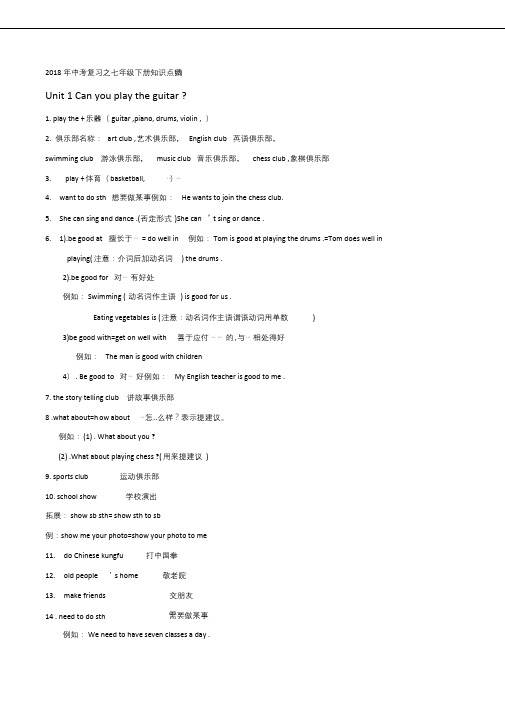
2018 年中考复习之七年级下册知识点归纳: Unit 1 Can you play the guitar ?1. play the +乐器( guitar ,piano, drums, violin , )2. 俱乐部名称: art club ,艺术俱乐部, English club 英语俱乐部,swimming club 游泳俱乐部, music club 音乐俱乐部, chess club ,象棋俱乐部 3.play + 体育( basketball,⋯)⋯4. want to do sth 想要做某事例如: He wants to join the chess club.5. She can sing and dance .(否定形式 )She can ’t sing or dance .6. 1).be good at 擅长于 ⋯ = do well in 例如: Tom is good at playing the drums .=Tom does well inplaying( 注意:介词后加动名词 ) the drums . 2).be good for 对⋯ 有好处例如: Swimming ( 动名词作主语 ) is good for us .Eating vegetables is (注意:动名词作主语谓语动词用单数3)be good with=get on well with善于应付 ⋯ ⋯ 的,与⋯ 相处得好例如: The man is good with children)4). Be good to 对⋯ 好例如: My English teacher is good to me . 7. the story telling club 讲故事俱乐部 8 .what about=h ow about⋯怎. .么样?表示提建议。
例如: (1) . What about you ?(2) .What about playing chess ?( 用来提建议 ) 9. sports club 运动俱乐部 学校演出10. school show拓展: show sb sth= show sth to sb例:show me your photo=show your photo to me 11. do Chinese kungfu 打中国拳敬老院 交朋友 需要做某事12. old people ’s home13. make friends 14 . need to do sth例如: We need to have seven classes a day .例如:We have no time to play games on weekdays .例如:My English teacher often helps us with our English. 19. on(或at) the weekend例:We are always busy reading English every morning .(2) 一般疑问句及回答,将Yes ,she can ./No ,she can 5. take (have ) a showerat eight thirty —five = at twenty —five to nine 11.询问时间:What’s the time ?= What time is it ?例如:It ’f s i ve six now .( 对划线部分提问)What’s the time now ?=What time is it now ?( 此处quick 修饰形容词) Tom eats breakfast quickly .( 此处quickly 修饰eat)18. for + 一段时间。
人教版英语七年级下Unit12课本知识梳理及课后习题

The train arrives inBeijingat 8 o’clock。
=The train gets toBeijingat 8 o’clock.
①本句是一个祈使句的否定句.祈使句是指动词原形开头,表达命令或者乞求的句子.其否定句是在句首加“Don't”构成.
Don’t listen to music in class。
Don’t play basketball in the classroom。
Don't run in the hallways.
practice作名词时,意思是“练习,实践,训练”。
Practice makes perfect。
It takes a lot of practice to become a good swimmer.
注意:区分every day和everyday
every day是名词短语,相当于副词,常用于作状语,意思是“每天”。everyday是形容词,常放在名词前作定语,意思是“每天的,日常的”.
=Which is your sister's hat?
②rule在句中作名词,“规则,规定”
We must obey school rules.
常见的词组:
obey a rule遵守规定break a rule违反规定
carry out a rule执行规定abolish a rule废除规定
③break是动词,“破坏,违反”,还可以表示“破坏,打破,打碎”。
人教版七年级下册英语教材内容

人教版七年级下册英语教材内容本文档旨在提供人教版七年级下册英语教材的完整内容,以供参考。
本教材内容主要分为以下几个模块:Unit 1: Greetings本单元主要介绍问候语、身份及国籍的表达方式。
研究者将学会如何用英语问候他人,并表达自己的身份和国籍。
Unit 2: Hobbies本单元主要介绍爱好和喜欢的事物。
研究者将学会用英语表达自己的爱好,并与他人分享。
Unit 3: School Life本单元主要介绍学校生活的相关内容。
研究者将研究关于上课、课间休息和活动的表达方式。
Unit 4: Food and Drinks本单元主要介绍食物和饮料的名称及相关表达。
研究者将学会用英语询问和回答关于食物和饮料的问题。
Unit 5: My Day本单元主要介绍日常生活中的活动及时间表达方式。
研究者将学会用英语描述自己的日常活动。
Unit 6: Holidays本单元主要介绍假期及旅行的相关内容。
研究者将研究关于假期和旅行的词汇和句型。
Unit 7: Weather and Seasons本单元主要介绍天气及季节的表达方式。
研究者将学会用英语询问和描述不同天气和季节。
Unit 8: Occupations本单元主要介绍职业和工作。
研究者将研究表示不同职业和工作的单词和句子。
Unit 9: Daily Routines本单元主要介绍日常生活中的一些常见活动。
研究者将学会用英语描述自己和他人的日常作息。
Unit 10: Shopping本单元主要介绍购物的相关内容。
研究者将学会用英语进行购物时的交流。
以上为人教版七年级下册英语教材的内容概述。
详细的课文内容和练题请参照教材本身。
祝您研究进步!。
更新新人教版七年级英语下册知识点全总结
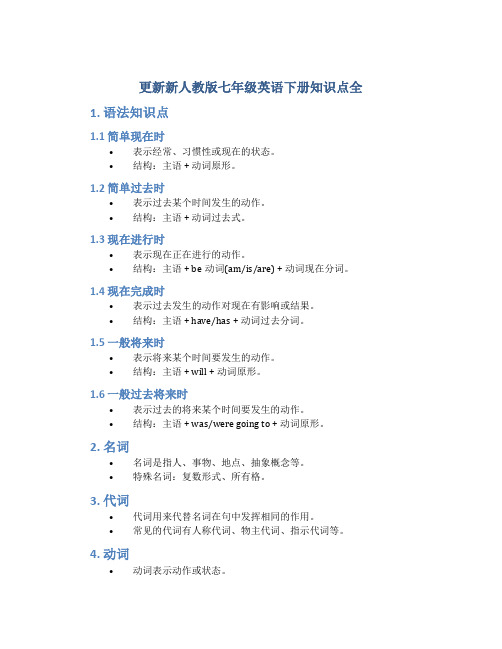
更新新人教版七年级英语下册知识点全1. 语法知识点1.1 简单现在时•表示经常、习惯性或现在的状态。
•结构:主语 + 动词原形。
1.2 简单过去时•表示过去某个时间发生的动作。
•结构:主语 + 动词过去式。
1.3 现在进行时•表示现在正在进行的动作。
•结构:主语 + be动词(am/is/are) + 动词现在分词。
1.4 现在完成时•表示过去发生的动作对现在有影响或结果。
•结构:主语 + have/has + 动词过去分词。
1.5 一般将来时•表示将来某个时间要发生的动作。
•结构:主语 + will + 动词原形。
1.6 一般过去将来时•表示过去的将来某个时间要发生的动作。
•结构:主语 + was/were going to + 动词原形。
2. 名词•名词是指人、事物、地点、抽象概念等。
•特殊名词:复数形式、所有格。
3. 代词•代词用来代替名词在句中发挥相同的作用。
•常见的代词有人称代词、物主代词、指示代词等。
4. 动词•动词表示动作或状态。
•不规则动词的过去式和过去分词需要单独记忆。
5. 形容词•形容词用来描述名词的特征或状态。
•形容词有三个级别:原级、比较级、最高级。
6. 副词•副词用来修饰动词、形容词或其他副词。
•副词有修饰程度的概念,可以用来表示程度副词。
7. 介词•介词是连接词与词之间的关系。
•常见的介词有in, on, under, behind等。
8. 冠词•冠词是指定名词的特定性质。
•常见的冠词有a/an, the。
9. 数词•数词用来表示数量或顺序。
•基数词表示具体数目,序数词表示顺序。
10. 句子结构•句子结构包括主语、谓语和宾语。
•主干部分是句子最重要的组成部分。
11. 祈使句•祈使句用来表示命令、请求、建议等。
•结构:动词原形 + 其他。
12. 时态•时态表示动作或状态发生的时间。
•常见的时态有现在时、过去时、将来时等。
13. 从句•从句用来修饰主句或作为主句的一部分。
新人教版英语七年级下册知识总结

新人教版英语七年级下册知识总结
本文档对新人教版英语七年级下册的知识进行总结,旨在帮助学生复重要内容。
Unit 1: Greetings
- 研究问候语和自我介绍的表达方式
- 研究如何用英语打招呼和道别
- 重点掌握名词的单数和复数形式
Unit 2: School Life
- 研究描述学校生活中的人物和活动的词汇
- 研究如何询问和回答关于学校的问题
Unit 3: Hobbies
- 研究不同的爱好和描述爱好的词汇
- 研究提问和回答关于爱好的问题
Unit 4: My Family
- 研究家庭成员的称呼和描述
- 研究如何提问和回答关于家庭的问题
Unit 5: Food and Drinks
- 研究描述食物和饮料的词汇
- 研究如何提问和回答关于食物和饮料的问题
Unit 6: Holidays
- 研究关于节日的相关词汇和表达方式
- 研究如何讨论和描述不同的节日
Unit 7: Daily Routine
- 研究描述日常活动和时间的词汇
- 研究如何描述自己的日常安排
Unit 8: Weather
- 研究描述天气状况的词汇和表达方式
- 研究如何讨论和描述不同的天气情况
以上是新人教版英语七年级下册的知识总结。
希望对学生们的复有所帮助。
人教版英语七年级下册教材详解

人教版英语七年级下册教材详解1、1)live on 以…为食;以…为生Tigers live on meat.2)live in 住在某地He lives in Beijing.2、dislike 不喜欢(=don’t/doesn’t/didn’t like)如:I dislike to go to the cinema.3、重点句子1)Where is he from ? = Where does he come from?2)He is from Japan. = He doesn’t come from Japan.3)Where does he live ? ----He lives in Tokyo.4)Please write to me soon. (write to sb. 写信给某人= write a letter to sb.)Unit 21、street 表“街道”,短语:on/ in the street 在街道上。
2、介词短语⑴ near 在…附近⑵ next to 紧挨着⑶ across from在…对面⑷ between ….and… 在A和B之间⑸ in front of 在…外面的前面:There is a tree in front of a house.⑹ in the front of在…里面的前面:The teacher is in the front of the classroom.⑺ behind 在…外面的后面:The ball is behind the door.⑻ in the back of 在…里面的后面My friend sits in the back of the classroom.3、through, across,over, 和past都是介词,不能单独做谓语,必须与动词连用才能做谓语。
1)through 从物体内部穿过,如:walk through a forest. 穿过一个森林2)past 从物体外面绕过, 如:walk past a post office 经过一个邮局3)across 从物体表面横穿,如:go across the road 横穿马路4)over 从物体上空越过, 如:fly over the city 飞过城市【注意】pass(经过),cross (横穿) 都是动词,可作谓语,相当于“动词+past/across”.如:①I pass (walk past) a post office every day. ② Don’t cross (walk across) the road.4、straight ⑴形容词,笔直的,直的:She has straight hair. 她长着直发。
七年级下学期英语全部知识点 人教版

七年级下学期英语全部知识点人教版Unit 1: Lets try to spell it.- Vocabulary: New words related to spelling and pronunciation.- Phonics: Practice phonics and improve pronunciation.Unit 2: What's the matter?- Vocabulary: Medical-related words and phrases.- Expressions of sympathy: Practice expressing concern, sympathy, and offering help.Unit 3: How was your school trip?- Vocabulary: Words and phrases related to school trips and outdoor activities.- Past tense: Practice using the past tense to talk about past experiences.- Descriptive language: Learn how to describe places, activities, and experiences.Unit 4: What's the best movie theater?- Vocabulary: Words and phrases related to movies, cinemas, and opinions.- Reviewing movies: Learn how to express opinions and write movie reviews.Unit 5: Do you want to watch a game show?- Vocabulary: Words and phrases related to game shows and TV programs.- Present continuous: Practice using the present continuous tense to talk about actions happening now.- Talking about TV programs: Learn how to describe and give opinions about different TV shows.- Vocabulary: Words and phrases related to future plans and careers.- Future plans: Practice talking about future plans and aspirations.- Career exploration: Learn about various careers and their requirements.Unit 7: Will people have robots?- Vocabulary: Words and phrases related to technology and the future.- Future predictions: Practice making future predictions using "will" and "won't".- Discussing the future: Learn how to express ideas and opinions about the future.Unit 8: How do you make a banana milk shake?- Vocabulary: Words and phrases related to recipes and cooking.- Imperatives: Practice giving instructions and following recipes.- Sharing recipes: Learn how to write and share recipes.- Vocabulary: Words and phrases related to parties and events.- Invitations: Practice inviting and responding to invitations.- RSVP: Learn how to accept or decline invitations politely.Unit 10: I'd like some noodles.- Vocabulary: Words and phrases related to food and ordering in a restaurant.- Ordering food: Practice ordering food in a restaurant.- Likes and dislikes: Learn how to express likes and dislikes about different types of food.Unit 11: How was your school day?- Vocabulary: Words and phrases related to daily school life.- Present simple: Practice using the present simple tense to talk about routines and habits.- Talking about school: Learn how to describe a typical school day.Unit 12: What did you do last weekend?- Vocabulary: Words and phrases related to weekend activities.- Past simple: Practice using the past simple tense to talk about past events.- Sharing experiences: Learn how to talk about what you did over the weekend.以上是七年级下学期英语全部知识点的概述。
人教版七年级英语下册知识点归纳总结
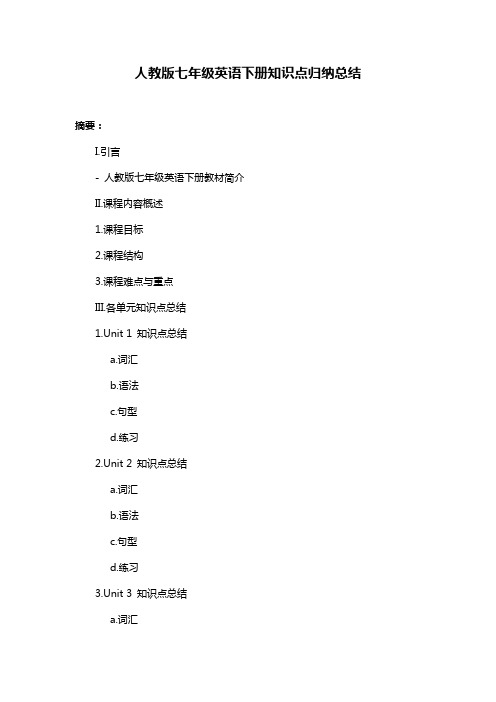
人教版七年级英语下册知识点归纳总结摘要:I.引言- 人教版七年级英语下册教材简介II.课程内容概述1.课程目标2.课程结构3.课程难点与重点III.各单元知识点总结1.Unit 1 知识点总结a.词汇b.语法c.句型d.练习2.Unit 2 知识点总结a.词汇b.语法c.句型d.练习3.Unit 3 知识点总结a.词汇b.语法c.句型d.练习IV.学习策略与方法1.学习计划与时间管理2.课堂学习方法3.课外拓展与实践4.自我检测与反馈V.结语- 总结与展望正文:【引言】人教版七年级英语下册教材是根据我国《义务教育英语课程标准》编写的一套适合七年级学生学习的英语教材。
本教材旨在帮助学生掌握基本的英语语言知识,发展听、说、读、写四项技能,培养学生的跨文化交际能力。
本篇文章将对七年级英语下册的知识点进行归纳总结,以帮助学生更好地学习和掌握英语。
【课程内容概述】1.课程目标七年级英语下册的课程目标是:使学生掌握一定的词汇、语法和句型,提高学生的听、说、读、写四项技能,培养学生运用英语进行日常交流的能力。
2.课程结构本教材共分为十个单元,每个单元包括听说、读写、文化视窗、学习策略、语言知识、语法、词汇、句型、练习等部分。
3.课程难点与重点课程难点主要集中在语法和句型方面,而重点则在于词汇的积累和运用,以及听、说、读、写四项技能的培养。
【各单元知识点总结】以下为各单元的知识点总结:【Unit 1】- 词汇:家庭成员、职业、问候等- 语法:一般现在时- 句型:介绍家庭成员、职业等- 练习:选择题、填空题、句型转换等【Unit 2】- 词汇:身体部位、疾病、药物等- 语法:一般现在时- 句型:描述身体部位、病症等- 练习:选择题、填空题、句型转换等【Unit 3】- 词汇:食物、饮料、餐馆等- 语法:一般现在时- 句型:询问食物、饮料等- 练习:选择题、填空题、句型转换等(此处省略其他单元的知识点总结)【学习策略与方法】1.学习计划与时间管理学生应制定合理的学习计划,确保每天有足够的时间学习英语。
最新人教版英语七年级下Unit12课本知识梳理及课后习题

Unit12 Don’t eat in class.Words and expressions:1.Which rules are these students breaking? 这些学生违反了哪些规定?①这是由疑问词which 引导的特殊疑问句。
Which 在本句中是疑问形容词,它还可以作疑问代词,“哪个,哪些”Which do you like better, classical music or popular music?Which sport is your favorite?Which 用作疑问代词时可以独立使用,用作疑问形容词后面须接名词,两种情况经过变化后可以互换使用。
Which hat is your sister’s?=Which is your sister’s hat?②rule 在句中作名词,“规则,规定”We must obey school rules.常见的词组:obey a rule 遵守规定break a rule 违反规定carry out a rule 执行规定abolish a rule 废除规定③break 是动词,“破坏,违反”,还可以表示“破坏,打破,打碎”。
The boy often breaks school rules.Who broke the window of the classroom?Break 作名词,“休息,中间,中断”。
Let’s take a ten-minute break.2.Don’t arrive late for class.①本句是一个祈使句的否定句。
祈使句是指动词原形开头,表达命令或者乞求的句子。
其否定句是在句首加“Don’t”构成.Don’t lis ten to music in class.Don’t play basketball in the classroom.Don’t run in the hallways.②区分arrive,get和which.句中的arrive 表示“到达,抵达”,为不及物动词,后面加宾语需加介词at 或in。
七年级英语下册-全册知识点梳理
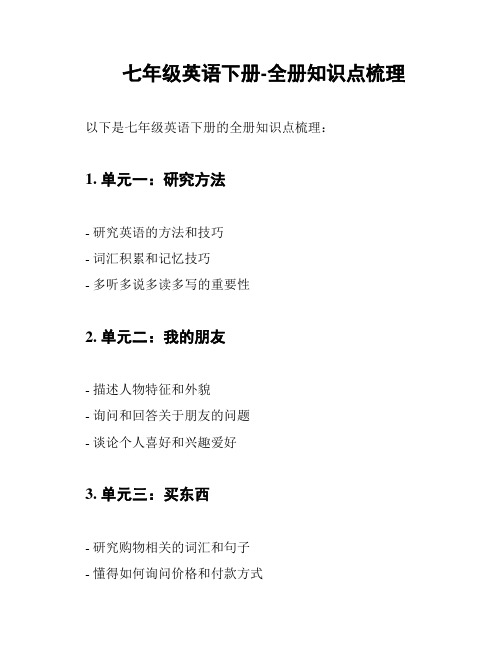
七年级英语下册-全册知识点梳理以下是七年级英语下册的全册知识点梳理:
1. 单元一:研究方法
- 研究英语的方法和技巧
- 词汇积累和记忆技巧
- 多听多说多读多写的重要性
2. 单元二:我的朋友
- 描述人物特征和外貌
- 询问和回答关于朋友的问题
- 谈论个人喜好和兴趣爱好
3. 单元三:买东西
- 研究购物相关的词汇和句子
- 懂得如何询问价格和付款方式
- 学会表达自己的购物意愿和偏好4. 单元四:我的学校
- 研究学校相关的词汇和句子
- 描述学校和课堂环境
- 谈论研究内容和学科
5. 单元五:我的生活
- 研究日常生活相关的词汇和句子- 描述自己的生活惯和家庭
- 谈论日常活动和时间安排
6. 单元六:我的假期
- 研究度假和旅行相关的词汇和句子- 描述过去和将来的假期计划
- 谈论旅行经历和感受
7. 单元七:我喜欢运动
- 研究运动项目和运动器材的词汇
- 喜欢和不喜欢的表达方式
- 谈论个人的体育运动经验和兴趣爱好
这份文档梳理了七年级英语下册的全册知识点,希望对你的学习有所帮助。
七年级下册英语知识点总结人教版
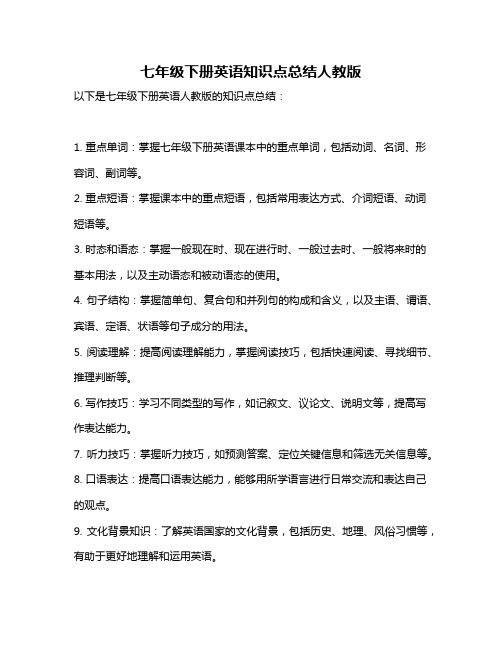
七年级下册英语知识点总结人教版
以下是七年级下册英语人教版的知识点总结:
1. 重点单词:掌握七年级下册英语课本中的重点单词,包括动词、名词、形容词、副词等。
2. 重点短语:掌握课本中的重点短语,包括常用表达方式、介词短语、动词短语等。
3. 时态和语态:掌握一般现在时、现在进行时、一般过去时、一般将来时的基本用法,以及主动语态和被动语态的使用。
4. 句子结构:掌握简单句、复合句和并列句的构成和含义,以及主语、谓语、宾语、定语、状语等句子成分的用法。
5. 阅读理解:提高阅读理解能力,掌握阅读技巧,包括快速阅读、寻找细节、推理判断等。
6. 写作技巧:学习不同类型的写作,如记叙文、议论文、说明文等,提高写作表达能力。
7. 听力技巧:掌握听力技巧,如预测答案、定位关键信息和筛选无关信息等。
8. 口语表达:提高口语表达能力,能够用所学语言进行日常交流和表达自己的观点。
9. 文化背景知识:了解英语国家的文化背景,包括历史、地理、风俗习惯等,有助于更好地理解和运用英语。
10. 词汇记忆:掌握有效的词汇记忆方法,如分类记忆、联想记忆、重复记忆等,能够快速扩大词汇量。
以上是七年级下册英语人教版的知识点总结,希望对您有所帮助。
人教版初一下英语课本全梳理(u10u12)

人教版初一下英语课本全梳理(U10—U12)今天的U11和U12将的是和一般过去时有关的内容,这也是初一和初二知识衔接的两个单元。
同学们在学习每个单元时,一定要弄清楚单元重点语法、单词、短语、句型以及话题,这样我们的学习才能有的放矢!(有的放矢的意思?哈哈,就是比喻说话做事有明确的目的性和针对性。
这里小简老师也给大家普及一下语文啦!)Unit 10 I’d like some noodles.【短语归纳】1. would like 想要2. take one’s order 点菜3. beef soup 牛肉汤4. one bowl of… 一碗……5. what size 什么尺寸6. mapo tofu with rice 麻婆豆腐盖饭7. what kind 什么种类8. small / medium / large bowl 小/ 中/大碗9. green tea 绿茶10. orange juice 橘汁11. around the world 世界各地12. birthday cake 生日蛋糕13. the number of… ......的数量14. make a wish 许个愿望15. blow out 吹灭16. in one go 一口气17. come true 实现18. cut up 切碎【用法集萃】1. would like + sth. 想要某物2. would like + to do sth. 想要做某事3. Why don’t you + do sth.? 何不做某事?4. the number of + 名词复数……的数量;a number of+名词复数许多……【典句必背】1. What kind of noodles would you like? 你想要哪种面条?2. I’d like beef noodles, please. 我想要牛肉面。
3. What size would you like? 你想要多大的?4. I’d like a medium bowl, please. 我想要一个中碗的。
- 1、下载文档前请自行甄别文档内容的完整性,平台不提供额外的编辑、内容补充、找答案等附加服务。
- 2、"仅部分预览"的文档,不可在线预览部分如存在完整性等问题,可反馈申请退款(可完整预览的文档不适用该条件!)。
- 3、如文档侵犯您的权益,请联系客服反馈,我们会尽快为您处理(人工客服工作时间:9:00-18:30)。
人教版初一下英语课本全梳理(U1—U3)Unit 1 Can you play the guitar◆短语归纳1. play chess 下国际象棋?2. play the guitar 弹吉他?3. speak English 说英语4. English club 英语俱乐部?5. talk to 跟…说?6. play the violin 拉小提琴7. play the piano 弹钢琴?8. play the drums 敲鼓?9. make friends 结交朋友10. do kung fu 练(中国) 功夫?11. tell stories 讲故事?12. play games 做游戏13. on the weekend/on weekends 在周末◆用法集萃?1. play +棋类/球类下…棋/打…球2. play the +西洋乐器弹/拉…乐器3. be good at doing sth.= do well in doing sth. 擅长做某事4. be good with sb. 和某人相处地好5. need sb. to do sth. 需要某人做某事6. can + 动词原形能/会做某事7. a little + 不可数名词一点儿…8. join the…club 加入…俱乐部9. like to do sth. =love to do sth. 喜欢/喜爱做某事◆典句必背1. —Can you draw 你会画画吗?—Yes, I can./No, I can’t. 是的,我会。
/不,我不会。
2. —What club do you want to join 你想加入哪个俱乐部?—I want to join the chess club. 我想加入国际象棋俱乐部。
3. You can join the English club. 你可以加入英语俱乐部。
4. Sounds good./That sounds good. 听上去很好。
5. I can speak English and I can also play soccer. 我会说英语也会踢足球。
6. Please call Mrs. Miller at 555-3721. 请给米勒夫人拨打电话555-3721。
◆话题写作Dear Sir,I want to join your organization (组织) to help kids with?sports, music and English.My name is Mike. I am 15 years old. I'm a student in No. 1 Middle school.I can play the guitar well. I can sing many songs. I can swim and speakEnglish well, too. I think I can be good with the kids. I also do well in telling stories.I hope to get your letter soon.Yours,MikeUnit 2 What time do you go to school◆短语归纳1. what time 几点2. go to school 去上学?3. get up 起床4. take a shower 洗淋浴?5. brush teeth 刷牙?6. get to 到达7. do homework 做家庭作业? 8. go to work 去上班?9. go home 回家10. eat breakfast 吃早饭?11. get dressed 穿上衣服?12. get home 到家13. either…or…要么…要么…14. go to bed 上床睡觉15. in the morning/afternoon/evening 在上午/下午/晚上16. take a walk 散步?17. lots of=a lot of 许多,大量?18. radio station 广播电台19. at night 在晚上?20. be late for=arrive late for 迟到◆用法集萃?1. at + 具体时间点在几点(几分)2. eat breakfast/lunch/dinner 吃早饭/午饭/晚饭?3. thirty/half past +基数词…点半4. fifteen/a quarter to +基数词差一刻到…点5. take a/an+名词从事…活动6. from…to…从…到…7. need to do sth 需要做某事◆典句必背1. —What time do you usually get up 你通常几点钟起床?—I usually get up at six thirty. 我通常6:30起床。
2. That’s a funny time for breakfast. 那是个有趣的早餐时间。
3. —When do students usually eat dinner 学生们通常什么时候吃完饭?—They usually eat dinner at a quarter to seven in the evening.他们通常在晚上6:45吃晚饭。
4. In the evening, I either watch TV or play computer games.在晚上,我要么看电视,要么玩电脑游戏。
5. At twelve, she eats lots of fruit and vegetables for lunch.在十二点,她午餐吃很多水果和蔬菜。
6. She knows it’s not good for her, but it tastes good.她知道它对她没好处,但是尝起来很好。
7. Here are your clothes. 这是你的衣服。
◆话题写作主题:谈论日常作息习惯My School DayI am a student. I usually get up at seven, and I eat breakfast at seven thirty. Then I go to school at eight. School starts at eight thirty. I eat lunch at twelve. I go home at 17:00. I often eat dinner at 19:00 and then play the piano. I do my homework at 20:00. At 22:00, I go to bed.Unit 3 How do you get to school◆短语归纳1. get to school 到达学校2. take the subway 乘地铁?3. ride a bike 骑自行车4. how far 多远?5. from home to school 从家到学校?6. every day 每天7. take the bus 乘公共汽车?8. by bike 骑自行车?9. bus stop 公共汽车站10. think of 认为?11. between…and…在…和…之间12. one 11-year-old boy 一个11岁的男孩13.play with…和…玩14. come true 实现?15. have to 不得不◆用法集萃1. take…to…= go to…by…乘…去…2. How do/does sb get to…某人是怎样到…的?3. How far is it from…to…从…到…有多远?4. It takes sb. some time to do sth. 做某事花费某人多长时间。
5. How long does it take to do sth. …花费多长时间?6. It is + adj. + to do sth. 做某事是…7. Thanks for + n./Ving 感谢你(做)某事。
◆典句必背1. —How do you get to school 你怎么去上学?—I ride my bike. 我骑自行车。
2. How far is it from your home to school 从你家到学校有多远?3. How long does it take you to get to school 去上学花费你多久?4. For many students, it is easy to get to school. 对很多学生来说,很容易到达学校。
5. There is a very big river between their school and the village. 在他们学校和村庄之间有一条很大的河流。
◆话题写作主题:上学的交通方式?写作思路:②开篇点题:点出自己的出行方式;②具体内容:自己选择这种交通方式的原因;③结束语: 表明自己的观点。
The Best Way for Me to Go to SchoolDifferent students go to school in different ways in our school, but I llike to go to school on foot.First, I live near the school, so my home is not far from my school. And it takes me a few minutes to get there. Second, there is a crossing on myway to school, and sometimes the traffic is very busy. I think it is safer to go to school on foot. Third, I think walking is good for my health. It’s a kind of sport and it makes me study better.So in my opinion, the best way to go to school is on foot. What about you。
